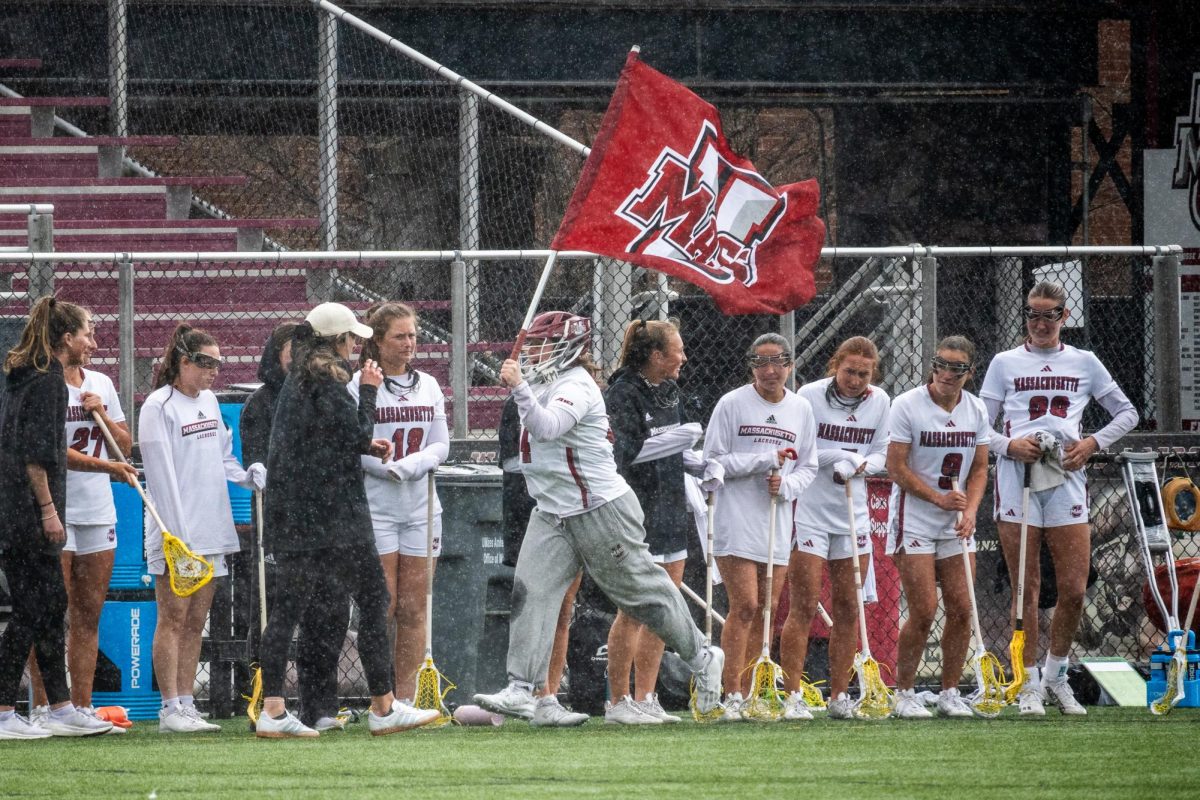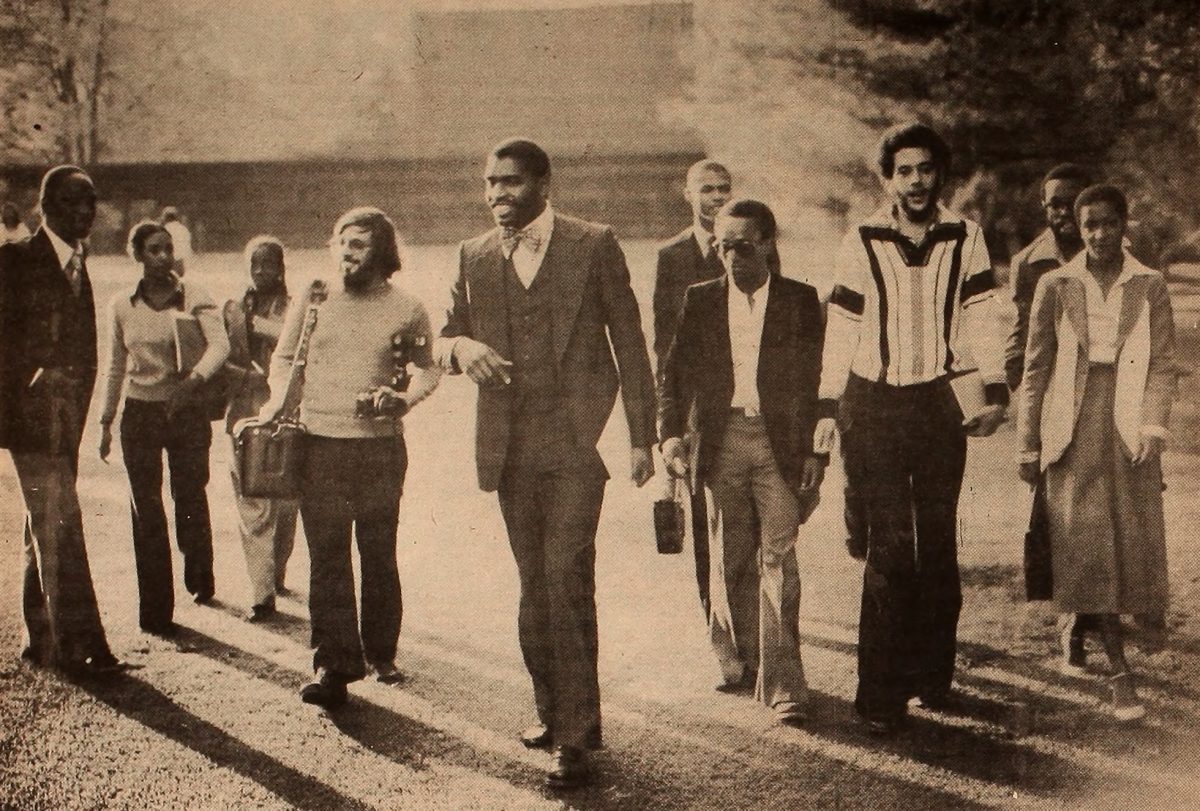
In a room full of economists, environmentalists and scientists, Dr. C. Arden Pope III was preaching to the choir when he advocated for legislative action based on the decades of scientific research that has legitimized the connection between a high concentration of air pollutants and detrimental health effects that tax the American economy with related medical costs.
Absent from Room 808 of the Campus Center at the University of Massachusetts Thursday night were the individuals who have repeatedly resisted the legislative change that the findings of Pope and his colleagues warrant: the politicians financially backed by the energy industry.
Pope, the Mary Lou Fulton professor of economics at Brigham Young University, was the visiting lecturer for the UMass Center for Research on Families’ Tay Gavin Erickson Lecture Series.
He opened his presentation, titled “Effects of Air Pollution on Human Health: Science, Public Policy and Controversy,” by connecting the surge of air pollution with the rise of capitalism.
“Go back to London and we see the iconic image of chimney smokestacks and smog…During the time when we start to struggle with air pollution, Adam Smith published ‘The Wealth of Nations’… At that time the thought was ‘What is pollution? Smells like money to me,’” Pope said.
Pope then presented historical examples where high levels of smog in small industrial areas coincided with spikes in deaths. A tipping point came in December of 1952 in London, dubbed the Great Smog of 1952, where a thick cloud of smog choked out the sun and resulted in a few thousand deaths over a period of a few days.
“The episodes spurred public action and led to a loss in faith for the doctrine of laissez-faire economics when dealing with externalities such as air pollution,” Pope said.
Similar but less drastic episodes in industrial cities in the United States led to a series of state-passed legislation which placed restrictions on levels of air pollutants. The newfound attention to capitalist driven environmental dangers eventually culminated in the federal Clean Air Act of 1970, passed by President Richard Nixon’s administration.
Pope said that by the 1980s, episodes of toxic smog had subsided and challenges arose to the connection between air pollution and health effects that spurred the passage of the Clean Air Act and granted the federal government power to influence production levels of mass industry through pollution regulations. Pope said that energy giants and the politicians who represented them attacked the regulations as costly endeavors informed by incomplete and correlative science.
Pope, originally an economist, explained that he entered the study of air pollution by accident. In the mid-1980s he lived in Provo, Utah. Provo consisted of “primarily white collar, non-smoking Mormons” but was the home of a steel mill that produced high levels of particulate matter that was trapped in the valley by the nearby mountain ranges. The steel mill temporarily closed for a year, unintentionally providing the perfect control for a study exploring the health of a population exposed to varying degrees of air pollution.
Pope and his colleagues analyzed hospital records, school attendance logs, death records and compared the statistics to measurements of particulate matter 2.5, the most common measurement of air pollution. Their study concluded that during the year when the steel mill stopped operations, the number of deaths and respiratory/heart-related illnesses dropped.
“There was a lot of controversy over the modeling and attempts to account risk factors unrelated to air pollution. No matter what precautions we took there was still debate…but you know what reduced the controversy? Over 250 articles that produced similar results,” Pope said.
The initial findings gathered from the study of Provo galvanized researchers to approach the issue on a grander scale. A team of Harvard researchers, including Pope, expanded the study by comparing health of populations living in the most and least polluted American cities.
Numerous studies produced by the country’s top researchers in collaboration with the American Cancer Society concluded that residents living in areas with high levels of air pollution had shorter life expectancies and higher levels of illnesses such as heart and lung disease.
The studies that dominated the top science and health journals led to amendments to the Clean Air Act, granting the Environmental Protection Agency more authority to regulate pollution levels. It also put the researchers in the cross hairs of individuals for whom pollution regulations equated to unwanted business expenditures. Pope said that findings resulted in a public attack by Texas Congressman Lamar Smith, who dismissed the studies as secret science of questionable legitimacy.
Smith audited the information compiled by the ACS and the team of Harvard researchers, and argued that a study calling for such drastic policy reactions should have all of its methods and information made public. The attack continues today; Smith is the sponsor of a pending bill dubbed the “Secret Science Reform Act of 2014,” which calls for all components of scientific research to be made available to the public.
“So we found ourselves in a catch-22,” Pope said. The legislation determined that the EPA could not act on a study unless all the information and material was available to the public online. We came to our conclusions by using thousands of people’s personal medical records that are protected by privacy law.”
He also said that the only way science could have a significant impact under these terms is to violate all ethics of privacy. Pope drove his point home, that despite the overwhelming evidence that reduction in air pollution led to healthier lives and reduced medical costs, politics still dominated whether the benefits of science would have a significant effect on the public.
Pope concluded his lecture by framing the issue in the same terms that motivate the politicians to resist legislative change informed by science: economics.
“I believe that clean air is a public good,” Pope said. “It creates healthy workers and healthy human capital, which equates to a healthy economy. Once the short term costs are absorbed by the companies who would be affected, it actually proves more expensive to retain the level of pollution versus implementing the environmental regulations that would lead to widespread health benefits.”
Brendan Deady can be reached [email protected].


















